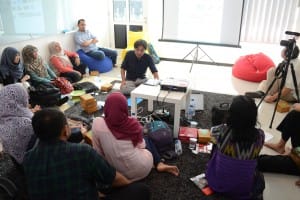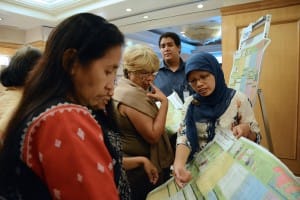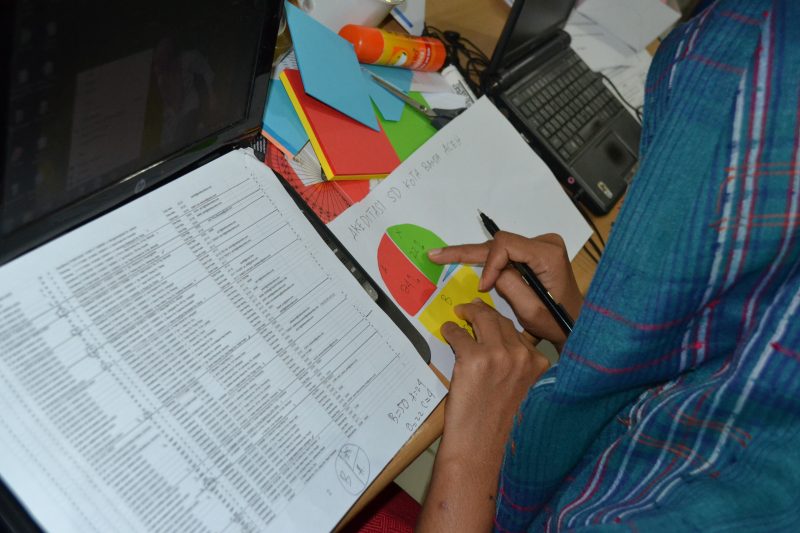In recent years, the world saw a drastic rise in the open government data movement. Countries like Singapore, Korea, Japan, the UK, and the US, among others, partook in unlocking government data and making it easily accessible to citizens. In Indonesia, open data initiatives are also making headway – many civil society groups rely on open data to further their advocacies and goals.
On March 5, dozens of events were held across the globe to celebrate International Open Data Day. Armed with little knowledge on the topic, I decided to attend one event that was hosted by the Open Data Lab Jakarta (Jakarta Lab), where data enthusiasts ranging from activists, journalists, to those who were simply curious gathered to discuss how Indonesia could benefit more from open data. Throughout the event though, the one question I kept asking was, “What exactly is open data?”
That day, I sat down with Andreas Pawelke to discuss what I previously thought was a foreign concept. Pawelke leads the World Wide Web Foundation’s Open Data Labs, and is one of the people behind the Jakarta Lab’s inception. He revealed that the idea behind open data is actually “quite simple”.
Pawelke suggests that open data has three crucial aspects: technical, legal and proactive disclosure. From the technical side, data should be machine-readable. This means that data should be easy to use and analyze using standard computers. Legally, everyone and not just certain groups should have access to data and be free to redistribute the data and the products and services that are built on it without copyright restrictions. And lastly, when it comes to disclosure, the government should be committed to releasing data to the public on a proactive basis.
As one of the first organizations in Southeast Asia to focus on open government data, the Jakarta Lab identifies social issues and aims to help solve them through open data and working together with various groups. They carefully conduct research to understand how data should be released, the legal frameworks governing its application, and what forms of constraint might come into play.
When they first opened in 2014, Indonesians were mostly unfamiliar with open data. As Pawelke recalls, “There was a bit of confusion about what open data is; what are the criteria for data to be open?” In time though, researchers, civil society groups, and even the government began seeing the value of open data as an efficient tool for achieving their goals.
The Jakarta Lab’s projects vary from collaborating with the Anti-Corruption Commission – better known as Komisi Pemberantasan Korupsi (KPK) – to assessing the income and asset declaration portal, to education and health agencies in Banda Aceh and Banyuwangi, to looking at areas for improvement in public service delivery. They use open data to help answer local students’ and parents’ inquiries related to the quality of education, school infrastructure, budgets, and more.
Outside of Indonesia, the Jakarta Lab has also had a fiscal transparency project, which resulted in empowering the ustazd (Islamic volunteer teachers) in Southern Philippines to use open data on the ‘Special Education Fund’ to negotiate the financing of their salaries and uniforms with their local government units.
In the general sphere, the availability of government data also stimulates more fact-based discussions between various groups, and hopefully lessens dialogues using arbitrary assumptions. Commenting on this, Pawelke thinks of it as a positive change that is not limited to Indonesia. “Basically, government data can inform a public dialogue because … we often have public debates and political decision-making that is often not so well-grounded in facts. And the data can really be a good foundation for such dialogue, because it captures hard facts and not just hearsay.”
The rising demand for open government data also comes with the need to provide more accurate analysis. Looking at the development of open data in Indonesia specifically, Pawelke believes that the country has been making progress in the last few years, with more and more organizations such as Perludem and Publish What You Pay throwing their support towards it. What’s more, he finds that this could also be chalked up to the government’s contributions to making data more accessible through national and local open data portals, data-driven public service delivery improvements, and other initiatives.
Subnational leaders and politicians in several areas, such as Bandung, Bojonegoro, Jogjakarta and Banda Aceh also aim to improve the quality of their work and enhance their performance by using their own data more effectively. To give a concrete example, Jakarta’s Governor, Basuki Tjahaja Purnama (Ahok) is also one of the supporters of the targeted analysis of government and citizen-generated data.
“Pak Ahok is a big fan of technology and data, so he is looking into using data collected through citizen complaint channels to assess performance of government agencies in Jakarta.” Pawelke says.
Notwithstanding the overall benefits that open data brings, Pawelke admits that some citizens are generally not too keen on learning more about open data, although he also thinks that this is not a major problem, stating, “We are not saying that everyone should be familiar with open data and using government data.”
But even if open data remains unfamiliar to some, people are still consuming data in their daily practices more than they know. “There is a mobile application that someone developed called Apaja. They created it to help people better navigate the city. People consume a lot of data, but they are just not really aware of it,” Pawelke says.
Thinking about this, whether you are using data to help you navigate the city, or stave off corruption, the proliferation of open data undeniably plays a key role and impact in our everyday lives.
For more information about the Open Data Lab Jakarta, visit labs.webfoundation.org or follow them on Twitter @ODLabJkt.
For more information about open data and the country rankings and performance, check the Open Data Barometer at www.opendatabarometer.org.




